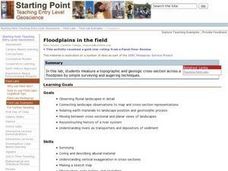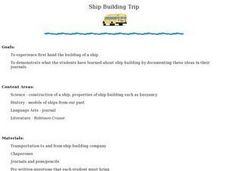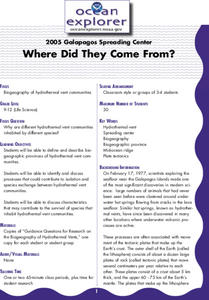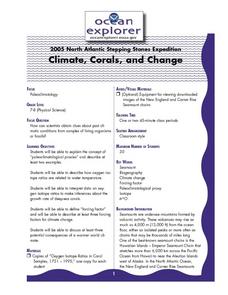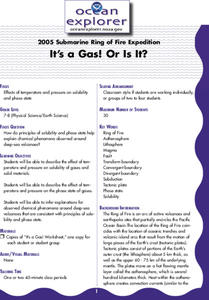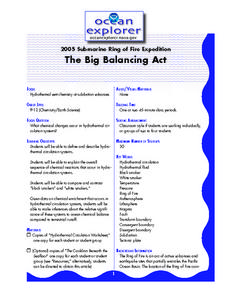Curated OER
Glacial Geology in the Field
Students examine the origin of glaciers, how glacial sediments are deposited, and what sedimentary records of glaciation provide about source and process of glaciers in a field lab.
Curated OER
Cool Lights
Students investigate how and why deep-sea organisms produce light. They examine how these processes can be used to study deep ocean environments.
Curated OER
Floodplains in the Field
Students measure a topographic and geologic cross-section across a floodplain using simple surveying and auguring techniques in a field lab. Students also reconstruct the history of a river system.
Curated OER
Ship Building Trip
Students travel to a ship building plant to see how they are built. They enter into discussion and writing about the task of the building. This lesson is multiple intelligence in design and valuable because of the real life exposure.
Curated OER
Fish Tunes
Students use their musical talent to create a song for the class fishtank. In a group, they compose two or three songs about their own tropical fish in which they can use any rhythm and musical instruments they choose. They perform...
Curated OER
And Now for Something Completely Different...
Pupils identify organisms that are typical a part of a hydrothermal vent. They examine why hydrothermal vents are short-lived.
Curated OER
Where Did They Come From?
Students explain hydrothermal vents and the process in which species and the hydrothermal vents become isolated.
Curated OER
Climate, Corals, and Change
Students examine oxygen isotope ratios and how they are related to water temperature. They also identify three forcing factor changes for climate change.
Curated OER
It's a Gas! Or is it?
Learners discover the principles of solubility and phase state and their influence on chemical phenomena observed around deep-sea volcanoes. They describe the effect of temperature and pressure on solubility of gasses and solid materials.
Curated OER
It Looks Like Champagne
Students determine some practical implications of the discovery of liquid carbon dioxide in deep-ocean ecosystems. They interpret phase diagrams and explain the meaning of "critical point" and "triple point."
Curated OER
The Big Balancing Act
Students describe chemical changes occurring in hydrothermal circulation systems. They make inferences about the significance of these systems to ocean chemical balance compared to terrestrial runoff.
Curated OER
It's in the Garbage
Students analyze how studying garbage relates to methods of archaeology. They examine garbage to determine things about their culture and relate that to prehistoric peoples.
Curated OER
Try to See It My Way
Middle schoolers participate in a game to identify with other people's points of view. They complete a worksheet about minefields and locate them on a map. They work together in groups to identify why the landmines were placed where they...
Curated OER
Islam in America
Learners examine the cultural and religious diversity within the United States. Using the differences, they discover they are a source of growth and change as well as conflict. They identify the changes that occur when new immigrants...
Curated OER
Bermuda: Search for Deep Water Caves 2009: Out of Darkness
Students analyze the three models on the origin of troglobitic fauna. In this life science lesson, students also consider how the Zonation model explains the fauna's origin. They also use the Internet to research solutional and volcanic...




